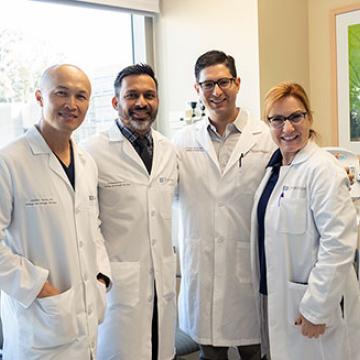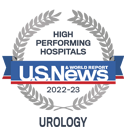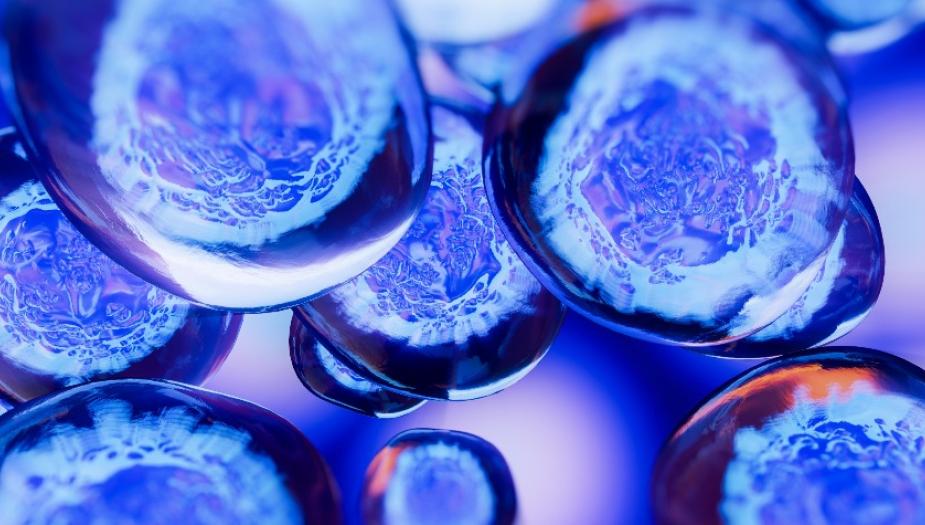Testicular Cancer Treatment Options
Testicular cancer is most frequently diagnosed in men ages 20 to 34. Most can be cured, even if diagnosed at an advanced stage.
How Is Testicular Cancer Treated?
Many testicular cancers contain tumors that are a mix of different cell types. For this reason, it's imperative that your doctor provide the most accurate diagnosis before recommending testicular cancer treatment, which may comprise surgery, drug therapy, chemotherapy or stem cell transplantation.
Fertility Preservation
Testicular cancer can often impact men at an age when they might be trying to start a family. Sperm banking is the easiest way to preserve fertility. Before treatment, sperm cells can be frozen and stored for future use. City of Hope also offers minimally invasive, nerve-sparing surgical options.
The City of Hope Difference
Every patient is different, with different needs. At City of Hope, we design a testicular cancer treatment plan just for you. Our multidisciplinary team works together to bring you precise, state-of-the-art surgery, drug and chemotherapy, and stem cell transplantation options that will deliver the best outcome possible. We support you every step of the way, both during treatment and long after, helping you and your loved ones manage your recovery, including sexual health and fertility preservation.
Photo: Jonathan Lim Yamzon, M.D., Ali Zhumkhawala, M.D., Alexander Chehrazi-Raffle, M.D., and Kathleen Burns, City of Hope nurse practitioner

What Testicular Cancer Doctors Will I See at My Appointment?
Your testicular cancer care team works together to find the most targeted, least invasive treatment for you, with the goal of preserving sexual health and fertility. Your care is coordinated by a multidisciplinary team, which may include several types of cancer specialists like:
- Urologists
- Medical oncologists
- Stem cell transplant care team
What Are the Different Types of Testicular Cancer Surgery

Surgery is the first treatment for nearly all testicular cancer stages. When possible, our highly skilled City of Hope surgeons use less invasive and robotically assisted techniques for preserving sexual health and fertility. The two main surgical options for treating testicular cancer are:
Radical Inguinal Orchiectomy
This procedure removes one or both testicles affected by cancer through the inguinal canal.
Retroperitoneal Lymph Node Dissection
If the cancer has spread to the abdominal lymph nodes, this surgery removes them through a large abdominal incision.
Drug Therapy for Testicular Cancer
City of Hope has a wide portfolio of cancer-fighting drugs available, allowing our medical oncologists to plan and prescribe a drug regimen that can best fight testicular cancer while minimizing side effects.
Chemotherapy for Testicular Cancer
Chemotherapy is the use of anti-cancer drugs to kill all rapidly dividing cells, including cancer cells. Not every testicular cancer patient requires chemotherapy, but in many cases it can be an important part of an effective treatment regime.
Stem Cell Transplant for Testicular Cancer Patients
Higher doses of chemotherapy are not always administered because they could damage the bone marrow, where new blood cells form. A stem cell transplant allows our doctors to use higher doses of chemotherapy without this risk. Prior to the procedure, a special machine collects blood-forming stem cells from the patient's bloodstream. The stem cells are then frozen and stored. The patient later receives a stem cell transplant that contains high doses of chemotherapy. Afterward, the stem cells are infused into the patient's veins so that they can start making new blood cells.
The Center for International Blood and Marrow Transplant Research has ranked City of Hope as an “overperforming” transplant center — the only U.S. transplant center with this recognition for more than a decade. Our transplant program is accredited by the Foundation for the Accreditation of Cellular Therapy, the standard of excellence for bone marrow and blood stem cell transplant programs in the United States.
